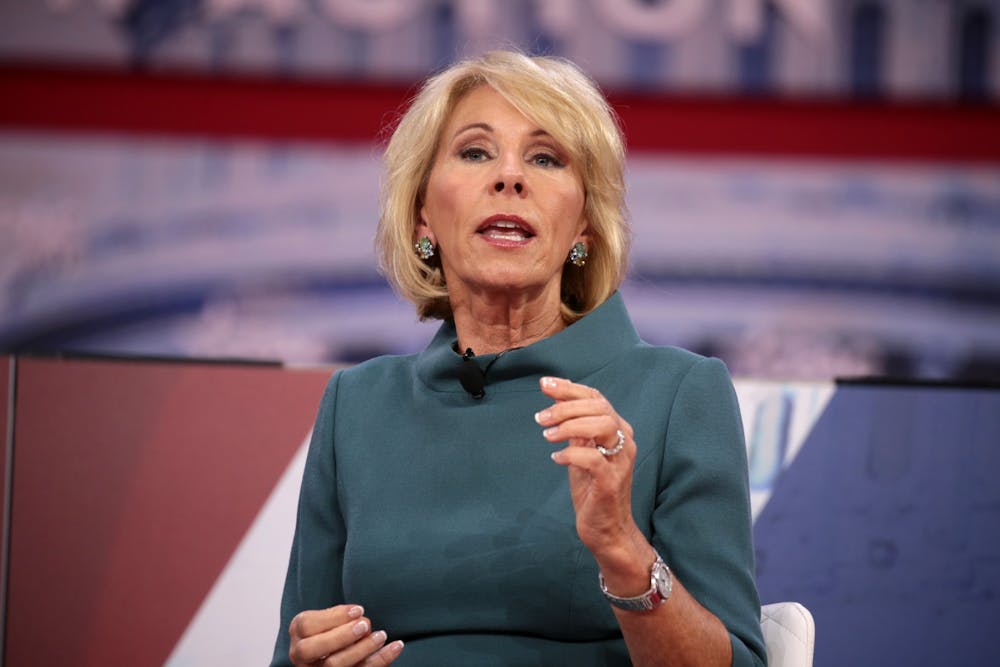Upon announcing its civil rights investigation into the University last month, the Department of Education (DOE) gave Nassau Hall 21 days to produce relevant documents and 28 days to make President Christopher Eisgruber ’83 available for an under-oath interview. A day after the second deadline, it remains unclear whether the University has complied.
When asked yesterday whether the University met the DOE’s deadlines, University Spokesperson Ben Chang wrote that “as we said before, the University will respond to the Department of Education’s letter in due course,” adding that the institution “disagrees with the premise of the Department’s argument.”
Asked the same question, a DOE spokesperson told the ‘Prince’ they “do not comment on open investigations.”
The DOE’s investigation centers around an early-September letter that Eisgruber wrote to the University community, in which he detailed his administration’s efforts to combat systemic racism. Eisgruber wrote that “[r]acist assumptions … remain embedded in the structures of the University itself” and that racism “persists at Princeton.”
Considering these statements an admission that “Princeton’s educational program is and for decades has been racist,” the Department is investigating whether the University has discriminated on the basis of race during Eisgruber’s tenure.
According to a letter from Assistant Secretary of Postsecondary Education Robert King, the Department may take “action to recover” the over $75 million in federal funds the University has received since 2013, when Eisgruber became president.
The University has denied any wrongdoing, standing by “its representations to the Department and the public that it complies with all laws and regulations governing equal opportunity, non-discrimination and harassment,” as well as Eisgruber’s statements about the prevalence of systemic racism.
“It is unfortunate that the Department appears to believe that grappling honestly with the nation’s history and the current effects of systemic racism runs afoul of existing law,” the University noted in its Sept. 17 statement. According to that statement, “the University will respond to the Department of Education’s letter in due course.”

In his letter, King requested the University respond to a set of written questions and produce a wide range of records by Oct. 7 — including all records relating to Eisgruber’s letter, ongoing anti-racist action, and systemic racism, as well as a “spreadsheet identifying each person” who was subjected to discrimination “as a result of the Princeton racism or ‘damage’ referenced in the President’s letter.” It also instructed the University to make Eisgruber available for an under-oath interview by Oct. 14.
In recent weeks, calls for the investigation to be dropped have mounted, especially after 90 college and university presidents denounced the DOE’s actions as “outrageous.”
Late last month, DOE press secretary Angela Morabito told The Daily Princetonian the letter concerned her, writing, “the allegations of current systemic racism at Princeton are deeply concerning. It’s doubly concerning that so many institution presidents would implore the Department not to investigate these serious accusations.”
Rep. Bonnie Watson Coleman (N.J.-12) condemned the investigation as “dumbfounding” and “mind boggling.” More recently, Senators Cory Booker (D-N.J.) and Bob Menendez (D-N.J.) urged Secretary of Education Betsy DeVos to reconsider the DOE’s investigation.

In their letter, Booker and Menendez wrote that the University’s efforts to examine and rectify social disparities that result from systemic racism “should be lauded, not punished.”
“We should be actively encouraging and supporting colleges and universities to examine the institutional and broader barriers that disproportionately impact underrepresented groups in this country, especially in the midst of a global pandemic,” they wrote.
Booker and Menendez also expressed concern about the “chilling effect” the investigation could spark for other institutions seeking to confront how they perpetuate and contribute to systemic racism.
The Trump administration’s education policies and rhetoric around race have already reverberated at universities across the country.
Days after the DOE announced its investigation, President Donald Trump signed an executive order restricting certain types of workplace bias training at any institution that contracts with the federal government. The order claims to combat “the pernicious and false belief that America is an irredeemably racist and sexist country; that some people, simply on account of their race or sex, are oppressors; and that racial and sexual identities are more important than our common status as human beings and Americans.”
Many consider the order — among the administration’s other statements — to deny the existence of systemic racism.
Last week, the University of Iowa suspended diversity, equity, and inclusion efforts and canceled training on race and sex stereotyping over fear of losing federal research grants. John A. Logan College in Illinois canceled a talk in honor of Hispanic Heritage Month for similar reasons.
The University, however, appears undeterred.
In early August, when asked about anti-racist training for students, faculty, and staff, Eisgruber said the University is “always looking for ways to improve what we’re doing around training” and would be “reviewing a variety of recommendations and suggestions that have come in with regard to what the University can do to stand against racism.”
Asked if the University has changed its position in light of the order or the DOE’s investigation, Chang wrote, “The University continues to review ideas and receive input from the campus community. That process is ongoing.”
Editor’s Note: A previous version of this story contained the phrase “the DOE’s order,” in reference to an executive order signed by President Trump, not the Department of Education. The ‘Prince’ regrets the error.








